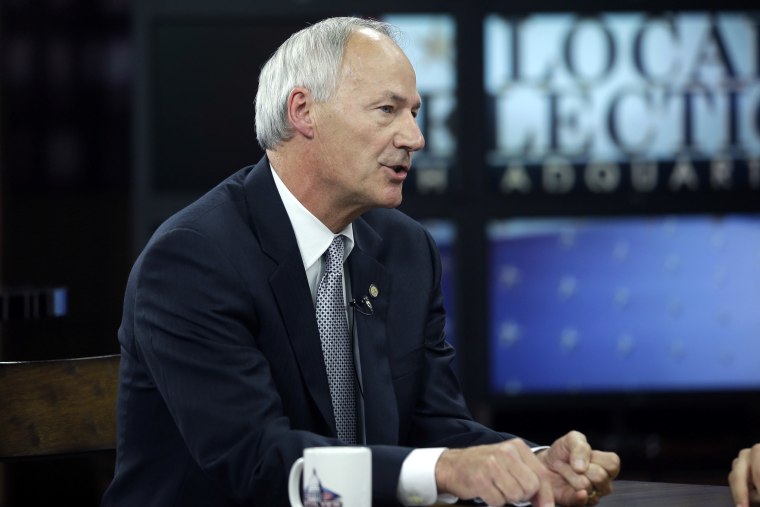Republican policymakers in Indiana, led by Gov. Mike Pence (R), were warned that approval of a right-to-discriminate bill would spark a civil-rights backlash against the Hoosier State. Pence and his allies didn't listen. They should have.
Condemnations of Indiana's new anti-gay measure have been fierce and widespread, and the GOP governor finds himself under intense fire from the private, public, and non-profit sectors. Pence is now open to making some changes, but while we wait, the damage has already been considerable.
And yet, 600 miles to the South, another group of Republican policymakers are watching this fiasco unfold, and they're
effectively asking themselves, "How can we bring a similar firestorm of criticism to our state?"
Arkansas' Republican-controlled House of Representatives gave its final stamp of approval Tuesday to House Bill 1228, otherwise known as the Religious Freedom Restoration Act (RFRA), according to KARK. It now heads to the desk of the state's Republican Gov. Asa Hutchinson, who said last week that he would sign the bill. [...] Arkansas' legislation is nearly identical to Indiana's RFRA, which has become the subject of widespread condemnation from businesses, organizations, celebrities and politicians.
As Emma Margolin's msnbc report
noted, Wal-Mart, a retail behemoth headquartered in Bentonville, Arkansas, yesterday announced its opposition to the measure and urged the governor to veto it.
"Every day, in our stores, we see firsthand the benefits of diversity and inclusion have on our associates, customers and communities we serve," CEO Doug McMillon said in a statement. "It all starts with our core basic belief of respect for the individual. Today's passage of HB1228 threatens to undermine the spirit of inclusion present throughout the state of Arkansas and does not reflect the values we proudly uphold. For these reasons, we are asking Governor Hutchinson to veto this legislation."
We'll learn later today whether Hutchinson, just three months into his first term, takes the advice seriously. But in the meantime, it's worth appreciating the degree to which Arkansas is deliberately following in Indiana's footsteps, despite Indiana's self-imposed political crisis.
The
Washington Post talked to professor Katherine Franke of Columbia Law School, who also serves as faculty director of the school's Public Rights / Private Conscience Project, to help flesh out the similarities between the measures.
"The Arkansas bill, like the Indiana bill, has a very broad definition of a 'person' who can assert religious liberty rights under the statute," Franke said, "and that definition is much broader than the federal definition, even as the Supreme Court recently interpreted it in Hobby Lobby," the 2014 case that considered whether or not a business could deny coverage for contraception based on the religious beliefs of its owners. "It's not just natural humans, people like you and me, but corporations of any kind. The federal court interpreted it only to apply to closely held corporations where the ownership is a small family and they all share the same religious commitments or beliefs." In Arkansas and Indiana, in other words, any business of any size can say that its religious liberty rights are being infringed, even if the corporation is, say, Walmart, the ownership of which is far from small. (Walmart actually came out in opposition to the bill.) This is why the scenario offered at the outset, of a business denying service to a gay couple, is so resonant. In Indiana and Arkansas, that business can claim infringement on its religious rights.
Franke went on to highlight ways in which the Arkansas proposal may, in some ways, be
worse than Indiana's, but it's tough to excerpt here. For more details, take a look at the
Post's
piece.
